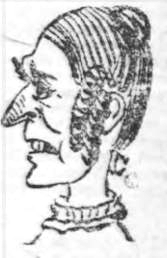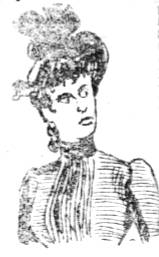This article has been transcribed from a copy of the Cardiff Timess in the online collection of scanned Welsh newspapers 1804-1919 in the National Library of Wales, with grateful recognition of the free access accorded to all readers. Where necessary paragraph breaks have been introduced for easier reading. The authorship of this article is not specified. It is full of remarks relevant to Wales and Welsh politics, including a reference to ‘Hen Wlad fy Nhadau’ (‘Old Land of my Fathers’), became the Welsh National Anthem in 1905.
The ironic use of the phrase ‘Smiling peace’ is more pointed than Samuel’s usual remarks. (It is a phrase much-used in late-eighteenth-century poems promoting peace with the American colonies in the 1770s.) The first illustration attaches the radical argument to the daily life of the indigent. This radical tone is unlike that of other articles by ‘Samuel’. The attack on commuted tithes identifies the article as Radical in politics and Non-conformist in religious beliefs. Of known contributors to Cardiff Times, a possible choice for author would be ‘Mabon’, or William Abraham MP (1842-1922), miner, trade-unionist, Liberal/Labour politician, and the reference to ‘Mabon’ in the text need not preclude this identification. The article is an attack on tithes, a tax on farmers for the maintenance of the Church of England, to which only a minority of the population of Wales belonged. The strategy of the article is to start by satirically discrediting the Shah, his politics and his supporters, at this allows the writer to equate the manifest injustice of his rule with the continuing collection of commuted tithes in Wales. The Tithe Wars, in which large forces of police and cavalry were deployed and numerous people were injured, suppressed protests against the forcible collection of tithes. This in time strengthened the Nonconformist case for the abolition of tithes, and led eventually to the disestablishment of the Church in Wales under the Welsh Church Act of 1920.
Along the way the argument proceeds by way of mockery, satirically deploying two high-profile libel cases, brought respectively by Charles Wood (1856-1945), Champion Jockey 1887, and the painter James McNeill Whistler, in each of which the juries found for the plaintiff but awarded a mere farthing [0.001 of a pound sterling] in damages. Their names are included in a comic list of contemporaries, resembling the one which the Lord High Executioner in the Mikado by Gilbert and Sullivan lists the miscreants he claims to have on his ‘little list’ for future execution. The entire article is an exercise in the satirical deflation of unjust power, and as such is also part of the anti-Conservative political stance of the Cardiff Times and it sister newspapers against the Western Mail and the Marquess of Bute. — David Skilton

“Nothing bud a harum-scarum old good for nothing, that’s what t’shah is. They’s better ha spent the brass on me.’
IR, who'll be here presently, will the Shah, the gentleman whose title of ‘Shah’ somehow always sounds to me like a sneeze. Yes, Nasr-ed-Din, will ere long be among us putting his ed-din (head in, I mean) wherever they'll have him. He has packed up a few little necessaries, such as a couple of shirts, a clean pocket handkerchief, and about a dozen or so of extra quality, warranted-for-ten-years wives, and he is now skooting about the continong anxiously looking about for a few odd Job lots of such goods as female operatic vocalists, ‘pigs-in-clover’ puzzles, tin whistles, and other useful articles, designed as presents for loyal subjects high in office and wives who are a bit inclined to turn nasty because the company was made up without them before it started on tour. I wish that the Shah, whilst he is buying up job lots of waste, would take back with him from this country Mr Balfour (his constituents at Manchester would sell him at a huge sacrifice), a few of our leading ‘comic’ vocalists, Mr Whistler, all the parachute men, the editors of all the ‘society’ papers, Charles Wood, the jockey, and a few other people who never would be missed. I'm afraid that the dominions of the Shah would never have the benefit of smiling peace again were his Most Omnipotent Ruler of the Earth (or whatever else he may choose to call himself; I'm rather shaky about his Sunday-best title) to carry out the programme I have indicated -- that is until he brought the bastinado and the bow-string into the argument.

A lady who would not like to meet the Shah lest he should put her into his harem.
I'm just a little bit surprised, sir, that certain of our English nobility should be so ready to entertain His Imperial Sunlight and Moonlight and All the Stars (is that the right title?) considering that the latter is apt to put strangers who have not yet got to know him in somewhat embarrassing positions. ‘He's all right when you know him, but you have to know him just,’ I can tell you. It comes rather awkwardly to an English nobleman to have, as a reward of his services, his mouth filled with ‘tomauns’ (anybody oblige me with change for a tomaun [Persian unit of currency]?) or to be presented with a smirking bride. Such present as the latter may imply much generosity of disposition on the part of the Shah (or it may not; you ‘tak's yer choice, nostrils‘), but the recipient's wife doesn't always look on a bit of a present of that sort in the same light, and neighbours and the maid of all work are apt to saying uncharitable things. No doubt His Most Exalted Panjandrum (that must be the proper title, surely) will distribute a number of orders — of course I don't mean orders for the theatre such as are usually throwing about in a good deal of profusion during this season of the year. I mean orders of merit, the Grand Medal of the Pewter Teapot, the Cross of the Tripe Warriors, and the Three Barred Badge Royal Beer Shifters. No doubt many of these orders will decorate the breasts of our English nobility hereafter — for I have reason to believe that they are not valuable enough to pawn.

“His wife daren’t spek to him, eh? But I’s let him know if I were one of them,”
The Shah is said to make himself quite at home where he stops. He spits on the floor and chucks the servant girls under the chin just as though the house were his own; he has all his butchers’ meat killed and cooked in his own bedroom just in a homely slaughterhouse sort of way, and he doesn't care that the wife of his host should do any extra cooking and washing for him. He never bothers her to lay an extra knife and fork for him at table no, he always carries them about with him in the shape of very fat fore fingers and thumbs. As for the ladies of the troupe, why they usually take pot luck in their piggings — diggings, I should say. The Shah's retainers have an essentially polite way of approaching him. His Ministers of State — his Persian Salisbury and W. H. Smith usually crawl into the Royal presence on their stomachs like so many fat snakes, and when the Transcendental Bigurg tells them politely to ‘get out,’ they crawl back again like so many crabs. He is very flexible in his manner is the Shah — which is perhaps the reason why he is by many called the Shah of Gutta-Percha. He is very flexible, I would repeat, in accommodating himself to the manners and customs of the nations with whom he stops; on this account he may shortly be expected to pose as the co-respondent in a high life divorce suit –– it is quite expected in this country of persons of exalted station. Probably he will also be warned off the turf, there is no telling — any how he is pretty certain to bring an action for libel against somebody or other in the Englishman-of-station way. So much have I the good of the nation at heart that I trust that his Shahship will form a close friendship with some leading lady on the stage and take a West End theatre for her. There are a good many leading ladies who are open to engagements of this sort just now, so that the Shah wouldn't have to look about him much.
I don't really know, sir, whether he is going to visit Wales, and if so, what his programme may include, but I should certainly advise him to have half a day's enjoyment down a coal mine. I have no doubt Mabon, with all his democratic leanings, would lend the Prince of Wales's fellow working man one of the suits of working clothes which Mrs Mabon so economically keeps in the ‘Cwtch dan y star.’ He might have a chance of securing cheap lessons in singing ‘Hen Wlad vy Nhadau’ as well as getting an insight into workmen's toepacks. Then be might have a little excitement in the way of a visit to a Tithe Sale. Perhaps the Chief-constable of Cardiganshire would be as ready to engage the Shah and his suit to support the police as if they were a force of cavalry. Then, too, he might get some harmless, if not edifying amusement for an hour say at the Cardiff Town Council.
I don't know how many titles the King of Kings (I believe that I've got to one of his titles at last) will confer when he comes to Leeds, I'm sure. A Pasha or two, or an odd Khan, or perchance a Bey would just furnish a nice sort of set-off to one or two of the Knights (Jubilee or otherwise) that the town boast, and that the town, after all, doesn't seem to regard as anything very much out of the common either. I don't think that an Englishman, though, would particularly care about holding the title of ‘Khan.’ There is such a sounding suggestion of being a ‘Tin Khan’ or a beer can about it. Irreverent journalists and people would be apt to sneer at it. And I am strongly of opinion that should any one of our Aldermen or even a councillor be made a Pasha that man's wife would object. I can conceive her saying, ‘A Pasha, are you, P'shaw with your Pashas and you. I expect you'll be wanting to go in for an Harem next — but let me catch you at it.’
I trust, sir, that you are duly looking out for my tickets in connection with the visit. If you are not, I shall have to call on the Shah on my own account, though whether he will reward me with the Order of the Push for doing so I know not.